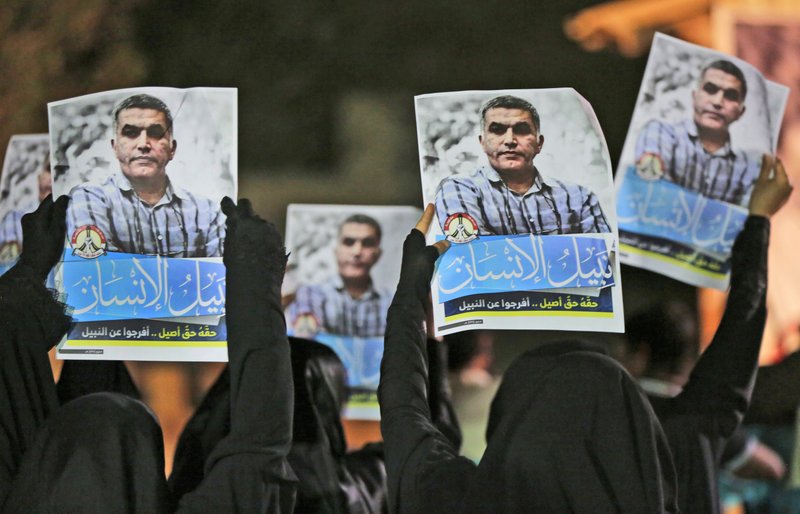
One of Bahrain’s most prominent activists was sentenced Monday to two years in prison in a verdict that rights groups say is the latest in a years-long crackdown on dissent that has seen all political opposition groups disbanded and activists jailed or forced into exile.
Nabeel Rajab was sentenced on charges related to TV interviews he gave in which prosecutors allege he disseminated rumors and false news relating to the situation inside Bahrain in a way “that undermines the prestige of the state,” according to several human rights groups closely monitoring the case.
Rajab’s case drew particular attention because he was a leading figure in the tiny island-nation’s 2011 Arab Spring protests, when tens of thousands of Bahrainis, who are majority Shia, took to the streets to demand a greater say in government from the Sunni monarchy.
Amnesty International said Rajab’s verdict is “the latest shocking display of zero tolerance for freedom of expression by the Bahraini authorities.”
Rajab has been imprisoned since June of last year, with nine months of that in solitary confinement, according to human rights groups such.
The US State Department has expressed concern over Rajab’s arrest and curbs on freedom of expression in Bahrain.
Bahrain, however, is also a close U.S. ally and hosts the Navy’s 5th Fleet. President Donald Trump has touted Washington’s “wonderful relationship” with Bahrain and his administration notified Congress earlier this year that it planned to approve a multibillion-dollar sale of F-16 fighter jets to Bahrain without the human rights conditions imposed by the State Department under the Obama administration.
Rajab has been hospitalized since April and did not attend the past nine hearings, the Bahrain Institute for Human Rights and Democracy said in a statement. The group said that since June, Rajab’s lawyers had also not been attending court sessions to protest hearings being held in absence of the defendant. Diplomatic observers also reportedly walked out of court in June due to these procedures.
Rajab faces another trial and up to 15 years in prison on separate charges related to tweets he wrote about alleged torture in Bahraini prisons. He also criticized on social media the war in Yemen, and the Saudi-led coalition’s bombing of rebels there. Bahrain is a member of that coalition. Those charges include “insulting a statutory body”, “spreading false news” and “insulting a neighborly country”.
Bahrain’s government suppressed the 2011 protests with the help of Saudi and Emirati forces. Over the past two years, the Bahraini government has moved to silence all major opposition parties and has stripped dozens of people of their nationality and sentenced others to execution or lengthy prison terms. The government has also tightened the reigns on journalists, including recently banning the country’s independent al-Wasat newspaper, which was forced to lay off all of its employees last month.
The crackdown has spurred low-level unrest and attacks by Shia militant groups against police. The government has accused these groups of receiving training and material support from Shiite power Iran, which lies across the Persian Gulf waters.




